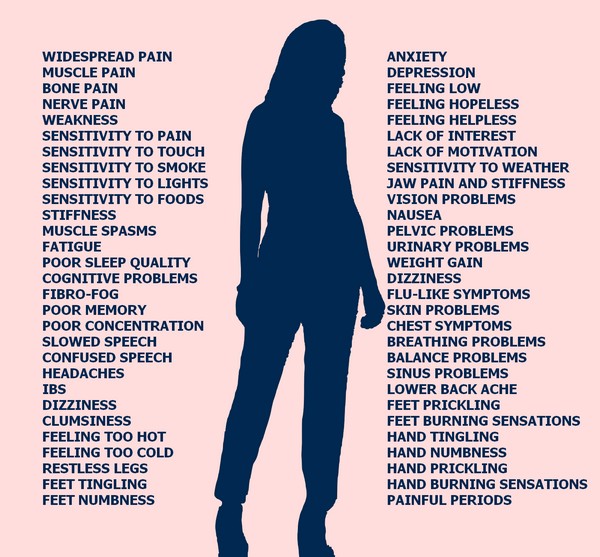Fibromyalgia Symptoms
Here I'm going to list some of the Fibromyalgia symptoms that people who are suffering with Fibromyalgia expereince.
Pain Fibromyalgia Symptoms
Typically people who have Fibromyalgia experience widespread pain throughout their bodies. This can manifest itself as muscle pain, tissue pain, joint pain, bone pain and nerve pain.
There are 3 types of pain that Fibromyalgia sufferers can experience - Hyperalgesia, Allodynia, Paresthesia.
Hyperalgesia translates from the Greek to excess pain ‘hyper’ meaning over, too much or excess and ‘algesia’ meaning pain. Experiencing Hyperalgesia means feeling pain from pressure or temperature that wouldn't ordinarily be painful.
Allodynia translates from the Greek as ‘other pain’. Experiencing Allodynia means feeling pain from a very light touch or from clothing.
Paresthesia translates from the Greek as 'abnormal feeling'. Experiencing Paresthesia means feeling crawling, burning, itching, tingling, pins and needles, numbing or prickling sensation in any part of your body.
Alongside the aches and pains you may suffer if you have Fibromyalgia you may also experience sensitivity to pain. This can mean any pain you experience – stubbing your toe, period pains, toothache etc. - can be magnified and exaggerated.
According to the NHS the criteria for diagnosing Fibromyalgia are that:
- You either have severe pain in 3 to 6 different areas of your body, or you have milder pain in 7 or more different areas
- Your symptoms have stayed at a similar level for at least 3 months
- No other reason for your symptoms has been found
The outdated Tender Points system has largely been replaced by taking into account that Fibromyalgia is much more than being poked in certain places by a doctor with an ‘ouch’ response.
It was way back in the early 1800’s that Dr. William Balfour at the University of Edinburgh identified ‘Tender Points’ in those suffering Muscular Rheumatism, (now known to be Fibromyalgia).
Cognitive Symptoms of Fibromyalgia
If you have Fibromyalgia, you may have cognitive symptoms such as poor memory and difficulty learning new things. You may experience Fibro Fog which affects your attention and concentration. You may ‘lose’ words or have slow or confused speech.
I often ‘lost’ a word mid sentence and could not finish a sentence. My husband often found me just staring aimlessly at nothing. I was becoming very forgetful and could not bring to mind people’s names, song titles or names of famous actors.
Fatigue Fibromyalgia Symptoms
Everyone at some time in their life can experience extreme tiredness – new parents, long haul flights, 24 hour charity events etc. – but experiencing extreme and chronic fatigue is on a whole other level. The chronic fatigue that Fibromyalgia sufferers have to endure is overwhelming.
It is akin to having a severe bout of flu every day and being forced to do a 24 dance marathon every day. They shoot horses don’t they?
For me, despite sometimes 8 -12 hours sleep; I would have at least 2 - 3 bouts of extreme fatigue in the day lasting about half an hour each time. This manifested itself as extreme yawning – perhaps yawning widely and taking my whole strength for 20 - 30 times in a row. Add to this a crushing weakness overtaking my whole body and being barely able to keep my eyes open. The timing of these bouts of fatigue made day to day life very difficult.
When not enduring a bout of fatigue I just felt extremely tired throughout each day, as if I’d run a marathon.
Sensory Symptoms of Fibromyalgia
The effects of noise, lights, smells and temperature can all manifest themselves into physical and mental symptoms for the Fibromyalgia sufferer.
Too much stimuli can bombard and overwhelm the fragility of the body and mind of someone who has Fibromyalgia and cause them to suffer physical pain, mental anguish and crushing fatigue.
For example a stressful mercy dash to a hospital filled with fluorescent lights, pungent smells and traumatised people can manifest itself in the Fibromyalgia sufferer as overall body pain, a panic attack or extreme fatigue in the following hours of experiencing the hospital visit. Similarly even, so called good experiences, such as a family celebrations can trigger the same responses.
I dread family get-togethers as too many people, too much noise, too much bright lighting always effects me in the following hours and days badly. I can be weeping with pain and anguish and feel dreadful. This effect is sometimes called a Fibro Flare.
And even mundane day to day experiences such as supermarket shopping can all be far too much for someone with Fibromyalgia to handle. Before I was well I could not walk by the freezer cabinets in supermarkets as I became far too cold and remained so for hours afterwards.
Mental Symptoms of Fibromyalgia

Anxiety, panic attacks, depression, mood swings, personality changes, bouts of sobbing, being over emotional, changes in eating habits, suicidal thoughts, lack of motivation and a ‘couldn’t care less’ attitude to family and friends are all mental symptoms of Fibromyalgia.
For me the mental Fibromyalgia symptoms manifested themselves in the form of lack of motivation. I just couldn’t be bothered to do any of the things I’d previously enjoyed. My craft projects lay unfinished, seeing the grandchildren was a chore and my social life was none existent.
But by far the worst mental symptoms of Fibromyalgia were the bouts of uncontrollable sobbing which came out of the blue and for no good reason. I sobbed for a good 10 -15 minutes at a time on most days. This was not just crying and being upset – it was major sobbing.
The sobbing bouts always accompanied times when I was in severe pain and exhausted. But I was not crying because of the pain I endured, (although I often wept silently when I was in pain), rather it was as if I was possessed. Something just came over me and I could not do anything about it. During these sobbing bouts I always looked on the bleak side and had had thoughts of suicide.
Once the sobbing subsided I was very quickly back to normal as if nothing at all had happened.
Weakness Symptoms of Fibromyalgia
Muscle weakness is yet another Fibromyalgia symptom. Many Fibromyalgia sufferers report difficulties in day to day activities such as lifting, stretching and bending.
At my worst my muscle weakness made me unable to fill and lift a kettle, unable to use a hairdryer and unable to lift things of shelves. I couldn’t bend to put laundry into the washing machine and certainly couldn’t peg out washing on the washing line.
Digestion Fibromyalgia Symptoms

Many Fibromyalgia sufferers have Irritable Bowel Syndrome (IBS) and complain of bloating, cramping, constipation and diarrhoea.
Other types of digestion Fibromyalgia symptoms include gluten intolerance, lactose intolerance, heartburn, acid reflux, gastritis and leaky gut.
My experience of digestion symptoms included pain in my stomach that was burning and gnawing. I had had this condition for many years with painful bouts brought on by stressful events. But in recent years it got so much worse and I was having painful bouts every day.
I also became gluten intolerant and lactose intolerant.
I kept the pain at bay with either Zantac (Ranitidine) or Losec (Omeprazole) but it became unbearable. I visited an Endocrinologist primarily to sort out my Hashimoto’s Thyroiditis and underactive thyroid. She was brilliant and diagnosed me as having the Helicobacter pylori (H. pylori) infection. She prescribed a course of antibiotics alongside a proton pump inhibitor to rid the infection.
Many Fibromyalgia Symptoms
Alongside the Fibromyalgia symptoms I've outlined there are many other symptoms of Fibromyalgia.
 Fibromyalgia Symptoms
Fibromyalgia SymptomsOther Conditions

Other conditions related to Fibromyalgia are:
Carpal Tunnel Syndrome which is a condition that causes pain, numbness and or pins and needles in the wrist, hand and fingers. Most Fibromyalgia sufferers experience Carpal Tunnel Syndrome bi-laterally (in both hands).
Tarsal Tunnel Syndrome which is identical to Carpal Tunnel Syndrome but it affects the ankles, feet and toes.
Costochondritis which is a very painful condition affecting the ribcage and can feel like having a heart attack. Costochondritis is where the cartilage that connects the ribs to the breastbone (sternum) becomes inflamed.
Plantar Faciitis which is the inflammation of the thick band of tissue (plantar fascia) on the bottom of the feet and can be intensely painful.
Restless Legs Syndrome (RLS) is as it sounds where there is an overwhelming urge to move the legs. Sometimes it is accompanied by a crawling or creeping sensation in the feet, calves and thighs.
Irritable Bowel Syndrome (IBS) is a chronic condition and causes symptoms such as stomach cramping, bloating, diarrhoea and/or constipation.
Migraines and headaches are often reported by people who have Fibromyalgia.
Chronic Fatigue Syndrome (CFS) is also known as Myalgic Encephalomyelitis (ME) and is a debilatating long term condition that causes extreme fatigue, insomnia, un-refreshing sleep and cognitive problems such as poor concentration and memory loss.
More on Fibromyalgia Symptoms
Fibromyalgia is a chronic condition characterized by widespread pain and tenderness throughout the body. In addition to pain, individuals with Fibromyalgia may experience a range of symptoms that can vary in severity from person to person. Here are some of the common symptoms associated with Fibromyalgia:
1. Widespread Pain: The hallmark symptom of Fibromyalgia is chronic, widespread pain that affects multiple areas of the body. This pain is often described as a deep, dull ache and can be accompanied by muscle stiffness.
2. Tender Points: People with Fibromyalgia may have specific tender points on their body that are sensitive to pressure. These tender points are usually located in the neck, shoulders, chest, elbows, hips, and knees.
3. Fatigue: Fatigue is a common symptom of Fibromyalgia and can range from mild to debilitating. People with Fibromyalgia often wake up feeling tired, even after a full night's sleep. The fatigue can interfere with daily activities and cause difficulty concentrating, known as "fibro fog."
4. Sleep Disturbances: Many individuals with Fibromyalgia have sleep disturbances, such as insomnia, restless legs syndrome, or sleep apnea. These sleep problems can contribute to the fatigue and overall discomfort experienced by people with Fibromyalgia.
5. Cognitive Difficulties: Fibro fog, or cognitive difficulties, is characterized by problems with memory, concentration, and mental clarity. It can be challenging to focus, remember things, and perform tasks that require mental effort.
6. Headaches: Migraines and tension headaches are commonly associated with Fibromyalgia. These headaches can be frequent and severe, adding to the overall burden of the condition.
7. Irritable Bowel Syndrome (IBS): Many individuals with Fibromyalgia also experience gastrointestinal symptoms, such as abdominal pain, bloating, diarrhea, or constipation. These symptoms are often diagnosed as irritable bowel syndrome (IBS).
8. Sensitivity to Sensory Stimuli: People with Fibromyalgia may have heightened sensitivity to various sensory stimuli, including light, noise, odors, and touch. This sensitivity can lead to increased discomfort or pain in response to these stimuli.
9. Depression and Anxiety: Fibromyalgia is often associated with mental health conditions such as depression and anxiety. The chronic pain and other symptoms can significantly impact a person's quality of life and contribute to the development of these conditions.
10. Muscle and Joint Stiffness: Stiffness, especially in the morning or after periods of inactivity, is a common symptom of Fibromyalgia. It can affect the muscles, joints, and surrounding tissues, making movement and physical activity challenging.
11. Numbness and Tingling: Some individuals with Fibromyalgia may experience sensations of numbness, tingling, or a pins-and-needles sensation in their extremities, such as the hands and feet.
12. Temperature Sensitivity: Many people with Fibromyalgia have difficulty regulating their body temperature. They may be more sensitive to cold or heat and may have difficulty tolerating extreme temperatures.